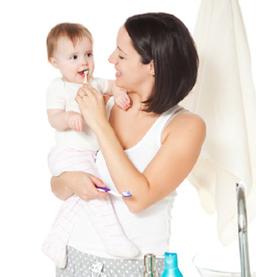Pregnancy and Oral Health
Pregnancy and Oral Health
Pregnancy and Oral Health
During your pregnancy you are more likely to get gum problems and cavities. In general, you can prevent these with extra attention to the care of your teeth.
More chance of inflamed gums
You probably know the saying that every child costs a tooth. Fortunately, that is not the case. Pregnancy does increase the risk of gum inflammation (gingivitis) in the mouth. The culprit is dental plaque. Due to an increased hormone level, your gums can react hypersensitively to dental plaque. As a result, it bleeds faster, swells and is more sensitive. Moreover, if you pay less attention to dental care and, for example, you eat more sweets during your pregnancy, the chance of getting cavities increases.
Pregnancy Precautions
With proper dental care, your teeth do not have to suffer during your pregnancy. Actually, it is a matter of continuing to brush carefully, twice a day. Also keep the spaces between the teeth clean with brushes, dental floss or toothpicks. The temptation may be great to spare gums that bleed (and are therefore inflamed). Moreover, it is tempting not to brush the back molars in case of nausea. Keep these places extra clean. A toothbrush with a small head is more tolerable in case of nausea. Do not consume sweets and drinks containing sugar too often. If necessary, visit your dentist or dental hygienist once more if you have any questions.
Please note: Excessive or incorrect use of oral hygiene aids can damage teeth and gums
Nauseous
Pregnancy is often accompanied by nausea. Some women are so nauseous that they vomit regularly. The temptation is great to brush your teeth immediately afterwards to get rid of that bad taste in your mouth. Still, it's better not to do that. Stomach acid attacks tooth enamel. The brush and toothpaste also have an abrasive effect. If you brush your teeth immediately after throwing up, you can easily brush away the tooth enamel. Rather rinse your mouth with water or a mouthwash.
Dental treatments during pregnancy
Before the check-up, tell your dentist or dental hygienist that you are pregnant. For the first three months of the pregnancy, he is reluctant to take X-rays, just to be on the safe side. Sometimes extensive dental treatment is postponed until after childbirth. But you can undergo most dental treatments without risk during pregnancy, even with anesthesia.
Take good care of children's teeth
When the baby is here, you naturally also want to take good care of your child's teeth and oral health. That care starts as soon as the first tooth has erupted. The age at which children get their first teeth differs per child. Usually the first baby tooth erupts between six and nine months.
Tips for healthy children's teeth:
- As soon as the first tooth has erupted, brush carefully with a special children's toothbrush and use fluoride toddler toothpaste.
- Brush your child's teeth once a day until the age of two. Start brushing twice a day from the second year onwards.
- Switch from a feeding bottle to a drinking cup as early as possible. Most children can learn to drink from a cup as early as nine months old. Limit the use of the baby bottle. Often sucking small amounts of juice from a baby bottle can seriously affect the milk teeth.
- Don't bring a bottle to bed. Not even with milk. Because milk also naturally contains sugar that can cause tooth decay. A bottle of water is not harmful.
